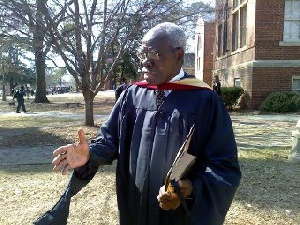Diasporia News of Wednesday, 16 February 2011
Source: gpb.org
Trail Blazing Student Returns To Mercer
MACON, Ga, USA. — Nearly 50 years after he first enrolled, Mercer University’s first black student returned to campus. Sam Oni reunited with his roommate to tell today’s students about what life was like on campus in the 60’s.
Oni first heard about Mercer while being taught by Baptist missionaries in his home country of Ghana. They encouraged him to apply to several Southern Baptist universities and Mercer was the only one that said yes.
Pre-med student Donald Baxter became his roommate and lifelong friend. Oni told a room full of students he was shocked by what he found here in 1963.
“To come to the United States and find that all wasn’t well, especially in the area of race relations was jarring to put it very, very delicately and disillusioning.”
Oni became involved in the Civil Rights movement while living in Macon. He went on to work as a journalist and college professor.
Mercer’s first black student relates experience
The American dream did not quite live up to reality for Sam Oni when he arrived in Macon in 1963.
In what was supposed to be a land of opportunity, Oni, a black man who became a Southern Baptist in his youth, instead met a wave of resistance.
Oni traveled from overseas to attend Mercer University, which was affiliated with the Georgia Baptist Convention at the time. Officials deliberated for a year about whether Oni should even be admitted, he recalled.
As the first black student to enroll in Mercer in 1963, Oni made many at the time uncomfortable.
Oni and his white roommate Donald Baxter talked about their experiences at Mercer during the school’s Founders’ Day program Wednesday, an event that began in 1891 to celebrate founder Jesse Mercer’s birthday.
Oni was born in present-day Ghana, and through his contact with Southern Baptist missionaries in the 1950s, he ended up enrolling at Mercer in the midst of the civil rights movement in the U.S.
Before coming to the U.S., Oni said he asked the Southern Baptist missionaries in Ghana, “What’s going on, and what is the church doing about racial understanding?”
The missionaries were too embarrassed to answer the question, Oni said.
Meanwhile, back at Mercer, then-sophomore Baxter was asked to become Oni’s roommate. Though Baxter hesitated at first, he eventually agreed to the arrangement.
That fall, Oni arrived at the university with the clothes on his back, a suitcase and a Bible in tow, Baxter recalled.
Oni was determined to come to Mercer, even when he was encouraged to attend Lincoln University in Pennsylvania and Atlanta’s Morehouse College instead.
“I felt it was a mission the good Lord had for me, and I had to carry it out,” Oni said.
From there, Oni and Baxter became instant friends, especially through the challenges Oni faced that year.
The two said they received a visit from Clifton Forrester, then-pastor of Tattnall Square Baptist Church, saying Oni would not be welcome to worship there.
“For the first time, I knew what it was like to be black and Sam Oni,” said Baxter, who at times was called racial slurs because of his friendship with Oni.
Eventually, they made their way to Vineville Baptist Church, where the Rev. Walter Moore welcomed Oni to the congregation.
Oni’s presence was controversial there, too, and the congregation took three votes before deciding Oni could become a member.
Even then, some were not happy about Oni being part of the church.
“The tension in the sanctuary was so palpable, you could slice it with a knife,” Oni said.
Oni helped Baxter, too, supporting Baxter as he studied to become a doctor and eventually gained admission to the Medical College of Georgia.
“I’m glad he left the light on,” Baxter said. “I’m glad he let me study physics and chemistry and biology.”
Baxter went on to receive international recognition for his work in sports medicine, working with athletes such as Brazilian gold medal Olympic runner Joaquim Cruz.
Through his time at Mercer, Baxter and others looked out for Oni, who went on to become part of the civil rights movement on campus and in Macon.
In his adult life, Oni has worked as a college professor, journalist, consultant and business owner.
Oni has come to view his experience at Mercer with forgiveness for those who discriminated against him and gratitude toward those who helped him.
“I don’t want to dwell too much on the negative, on the past,” Oni said. “Whether we like it or not, we do not live in the past, or in the future either. We’re left with the here and now, appropriately called the present. It’s a gift.”
Since that first meeting in fall 1963, Baxter and Oni have remained friends 48 years later.
“History happened before our eyes,” Baxter said. “I don’t think we saw the significance until we looked back.”
To contact writer Andrea Castillo, call 256-9751.











